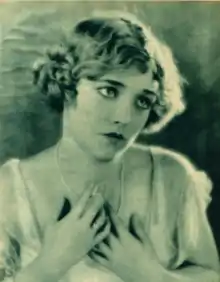Ingénue
The ingénue (/ˈɑːnʒeɪnjuː, -nuː/ or /ˈæ̃ʒənjuː, -nuː/) is a stock character in literature, film and a role type in the theater, generally a girl or a young woman who is endearingly innocent. Ingénue may also refer to a new young actress or one typecast in such roles. The term comes from the feminine form of the French adjective ingénu meaning "ingenuous" or innocent, virtuous and candid. The term may also imply a lack of sophistication and cunning.


Typically, the ingénue is beautiful, kind, gentle, sweet, virginal and often naïve, in mental or emotional danger or even physical danger, usually a target of the cad—whom she may have mistaken for the hero. The ingénue usually lives with her father, husband, or a father figure. The vamp (femme fatale) is often a foil for the ingénue (or the damsel in distress).
The ingénue is often accompanied with a romantic side plot. This romance is usually considered pure and harmless to both participants. In many cases, the male participant is as innocent as the ingénue. The ingénue is also similar to the girl next door stereotype.
In opera and musical theater, the ingénue is usually sung by a lyric soprano. The ingénue usually has the fawn-eyed innocence of a child but subtle sexual appeal as well.
References
- Child, Ben (January 5, 2015). "Russell Crowe: Female Actors Should Act Their Age". The Guardian. London. Retrieved 2015-01-05.
- Silver, Elizabeth L. (August 19, 2013). "The Death of the Ingénue". The Millions. Retrieved 2015-01-05.
External links
 The dictionary definition of ingenue at Wiktionary
The dictionary definition of ingenue at Wiktionary